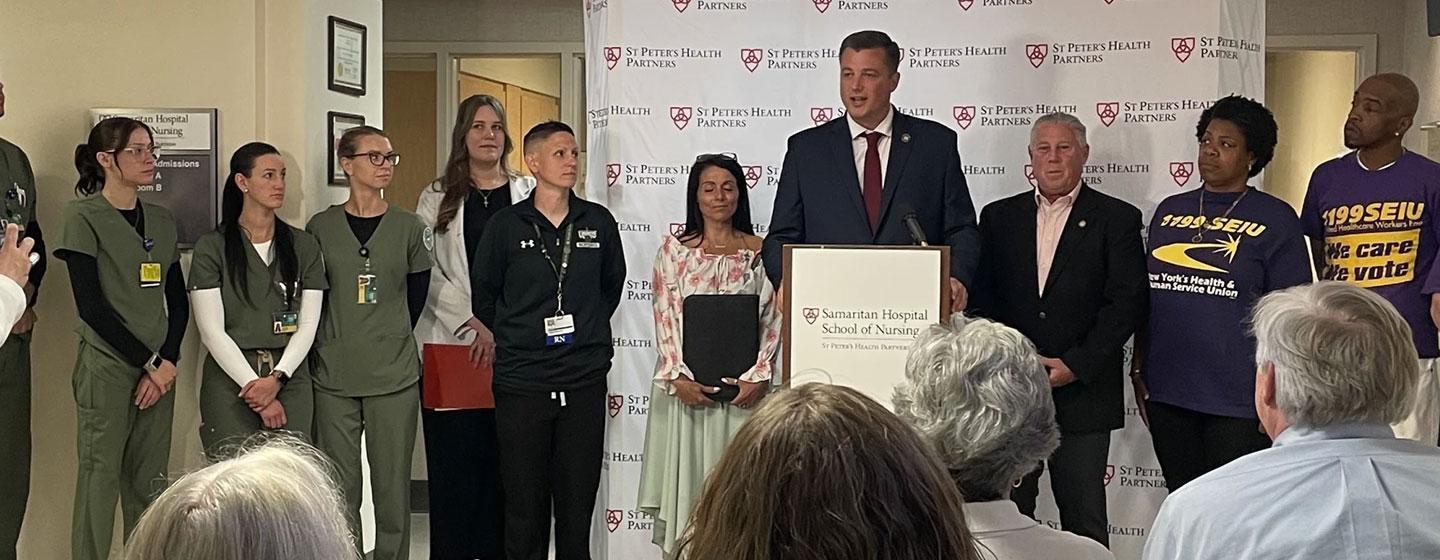Hochul Pauses Congestion Pricing As Other Environmental Bills Flounder

Governor Kathy Hochul has put on hold the start of New York City’s congestion pricing plan, which was due to begin at the end of the month. As Karen DeWitt of the New York Public News Network reports, the decision comes as other anti-climate change initiatives are floundering, as the legislative session draws to a close.
Governor Hochul, citing concerns about inflation and the post-pandemic trend of fewer people commuting to offices, has paused a plan to charge $15 for cars coming into Manhattan south of 60th Street.
“Let’s be real. A $15 charge may not seem like a lot to someone who has the means. But it can break the budget of a hard-working or middle-class household,” Hochul said. “ It puts a squeeze on the very people who make this city go. The teachers, first responders, small business workers, Bodega owners. And given these financial pressures, I cannot add another burden to working in middle-class New Yorkers, or create another obstacle to our continued recovery.”
Hochul made the announcement in a pre-recorded message. She did not take questions from the media.
The congestion pricing plan spurred opposition from some commuters, Democratic politicians including the governor of New Jersey and some State Senators on Long Island and in the Hudson Valley, as well as former President Donald Trump, a Republican who is running for a second term against incumbent democratic President Joe Biden.
By delaying congestion pricing, Hochul is potentially taking an issue away from Republican candidates for Congress in several competitive downstate districts. In 2022, the GOP flipped four seats in New York from Democratic to Republican and helped Republicans gain control of the House.
Progressive democratic lawmakers condemned the move, calling it a political betrayal, and predict that the reversal will backfire on the democrats. Assemblyman Robert Carroll represents portions of Brooklyn.
“I don't think that's a winning political strategy. And I think I saw Republicans both at the local state and federal level today, crowing that they won, that's going to be on political ads throughout November,” Carroll said. “And I think that this is going to blow up in all of their faces.”
Assemblymember Emily Gallagher says she was angered to hear about Hochul’s decision from the news media. She says the legislature approved the plan 5 years ago and was not consulted about the change. Gallagher says she and the others were particularly taken by surprise, since the announcement comes just weeks after Hochul was featured at an international summit on the climate crisis sponsored by the Vatican, where she met with the Pope. she also attended a conference in Ireland where she highlighted steps the state is taking to reduce greenhouse gas emissions, including congestion pricing.
“ And now all of a sudden, she is adding on to this delay,” Gallagher said. “Where is the political courage to see something through that we desperately need?”
The congestion pricing plan was to have generated $1 billion dollars a year in tolls to be used to improve public transportation.
Hochul’s announcement comes as other environmental and anti-climate change bills are floundering in the state legislature.
Supporters of an expanded bottle deposit law rallied at the Capitol earlier in the week.
They are seeking an expansion of container deposits for wine, liquor, and nearly all non-carbonated beverages. They also want to double the deposit from 5 cents to 10 cents.
Blair Horner is with the New York Public Interest Research Group.
“I think we'd all agree that things that were worth a nickel in 1983 are not worth a nickel today,” Horner said.
A measure to prevent gas utilities from charging ratepayers to subsidize new gas lines, known as the NY HEAT Act, is also failing to gain enough traction, so far, to make it to a floor vote in both houses.
And a proposal to reduce plastic packaging by 50% has been weakened to a goal of just 30% over the next dozen years.
Horner, who has lobbied on environmental and other progressive-leaning issues for years, says companies seldom want to change to respond to environmental concern.
“it's usually industry opposition and they build coalitions and they spend tons of money to astroturf their perspective against the needs of real people climate change isn't going away
Advocates have not given up hope. The session is not due to end until the weekend, and there’s a lot that can happen before then.
Related

Proposed Legislation Could Support Healthcare Workers in New York
With the legislative session in its final week, two state lawmakers from the Capital Region are pushing for more support for nurses.


